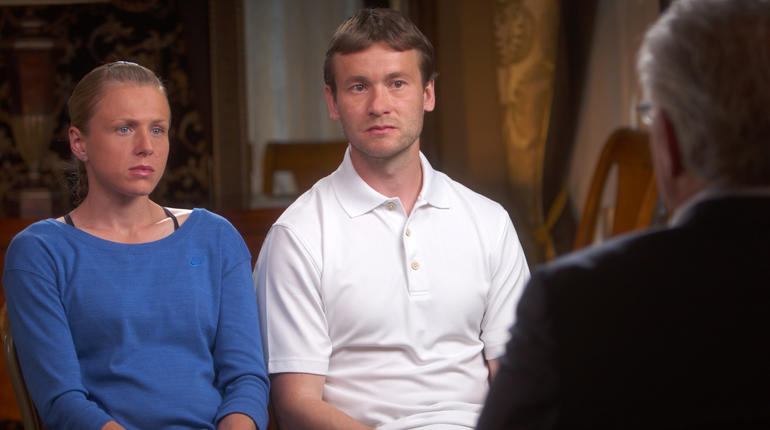Russia Proudly Owning The Podium
 |
| Getty Images |
Russia Proudly Owning The Podium
"Athletes have lost faith in the process and the way that they're being protected. It makes you question your faith in the whole system and whether the playing field truly is even."
Hayley Wickenheiser, Canadian hockey player, five-time Olympic medallist
"I often wondered what I was to WADA [World Anti-Doping Agency]. I didn't know if I was an informant or just a pain in the butt."
"It was a list of Vancouver [Russian athletes at the Vancouver games] athletes who had prepared at doping. RUSADA [Russian Anti-Doping Agency] was to co-operate on those athletes and only test them when the ministry allowed."
"I saw that my wife, everyone who was inside the Russian system, they were right. There was no doping fighting. It is just politics."
Vitaliy Stepanov, former Russian anti-doping agent
 |
Yuliya and Vitaly Stepanov
CBS News
|
"In simple terms, it came down to the fact that we, as an organization, didn't have any investigative powers."
"[WADA created an investigative team] to facilitate inquiries and investigations by co-operating with the relevant national and international organizations and agencies."
Ben Nichols, WADA spokesman
"I left the meeting a little perplexed. I thought maybe they just needed some time to consider this."
"The curtain had been pulled back here of a state-sponsored methodology of undermining the anti-doping system and cheating, and yet only one sport was going to be affected? What about the other sports?"
Beckie Scott, chair, WADA athlete's committee
 |
| A woman walks into the head office for the World Anti-Doping Agency (WADA) in Montreal, Canada. |
It took until early 2014 before a senior WADA authority directed Mr. Stepanov to make contact with a German journalist because he too finally became disillusioned, convinced that WADA would simply sweep away the claims and make no effort to investigate. But the facts leading to the certainty that at the last two Olympics Russian athletes used banned drugs to give them an advantage over the athletes of other nations can no longer be ignored.
From the very first revelations in 2010, Mr. Stepanov informed WADA officials it was not only that individual athletes and coaches were involved in unfair advantages. What was happening was an institutionalized, systematic determination to cheat, led by the state. Juliya, Mr. Stepanov's wife, was herself an elite Russian runner. She had informed her husband in no uncertain terms that for years she had used anabolic steroids and endurance boosting drugs without once being apprehended.
She was coached in drug use by Russian physicians and Russian coaches. And it wasn't just track and field. A colleague at the Russian Anti-Doping Agency had informed Mr. Stepanov when he worked there too that a list of athletes' names whom Russia's sports ministry had sent over were of athletes called "the untouchables". Their samples were to be strictly avoided unless and until the all-clear was given to test them. WADA, for its part, claims it was missing the authority to conduct investigations.
But then it hired an investigative officer, a former DEA agent, Jack Robertson. And Mr. Robertson exchanged emails with Mr. Stepanov. When it was obvious that Mr. Stepanov had blown the whistle against Russian athletes, his government and the agency for whom he worked, he was dismissed from his job at RUSADA, ostensibly as a result of 'restructuring'. And then, he received an email from Mr. Robertson that was different in tone.
He was urged by the WADA investigator to contact Hajo Seppelt, a German reporter and film-maker whose enquiries into Russian doping had taken place on previous occasions. Out of that contact a documentary, Top Secret Doping: How Russia Makes Its Winners, aired in December 2014 on German television. In short order, WADA finally received the authority to investigate. And last November WADA publicly released results of its investigation.
Unsurprisingly it corroborated what was told to it by Mr. Stepanov of widespread government and doping agency collaboration on supplying drugs to Russian athletes and protecting them from detection. But that doping revelation was confined to Russian track and field while merely suggesting in their announcement that doping was rampant in other sports fields with the involvement of government.
At a WADA meeting shortly afterward, Beckie Scott, chair of the agency's athlete's committee insisted WADA officials open a follow-up investigation into all Russian Olympic sports programs, and her recommendation was set aside. Later, she and other athletes renewed calls for a wider investigation. Finally, last month 60 Minutes aired an interview with Mr. Stepanov and his wife. And then Grigory Rodchenkov, a former director of a Russian anti-doping laboratory informed the New York Times of assisting in the sabotage of drug testing at the 2014 Sochi games.
Which led the International Olympic Committee to retest urine samples from previous games and WADA to open a second, widesweeping investigation of Russian sports. WADA intends to complete this latest investigation by July 15 to enable a decision relating to Russia's participation in Rio to be made in good time. "It'll be high-speed, but it'll be thorough", noted Dick Pound, former WADA president.
Sir Craig Reedie, WADA's current president who is also an IOC vice-president, is being regarded in a less than favourable light. "Craig Reedie is a vice president of the IOC first and a WADA president second. It's just appalling. Instead of standing up and doing his job, he's just waiting to see which way the wind is blowing", stated a disgruntled individual with insider knowledge and experience of WADA, speaking on condition of anonymity.
Labels: Corruption, Drugs, Olympics, Russia, Sports

<< Home